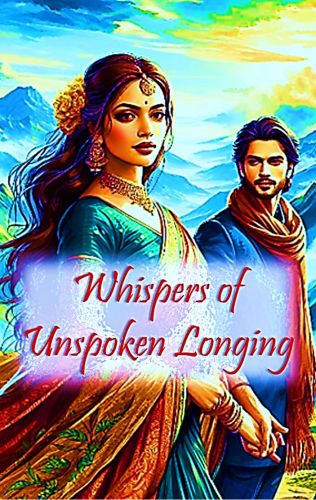Whispers of Unspoken LongingA Story by B. VedhaA Tale of Silent Admiration: Unveiling Emotions Through Poetry and Compassion. Will Love Triumph Over Tradition?
My next-door neighbor is a widow. She's like a fallen chrysanthemum, not meant for a life of
ease but rather for religious observances. I admired her quietly, never daring
to share my feelings with anyone, not even with myself. My closest friend, Arnav, remained oblivious to this. I had
concealed this profound emotion, cherishing its purity. In doing so, I felt a
sense of pride. But the turmoil within me refused to stay contained like a
river's source. I sought an outlet, fearing that failure would create a
whirlpool of pain within me. So, I considered expressing myself through poetry. However,
my pen hesitated to take the lead. What's surprising is that just then, my friend Arnav
suddenly began writing poetry at a remarkable pace, as if motivated by an
earthquake. The unfortunate man had never encountered such a situation
before, so he was unprepared for this unexpected upheaval. He had no grasp of
rhyme, yet I was amazed to see him dive right in. Poetry, like a second wife in old age, had captured his
imagination. He became my refuge for guidance and refinement. The themes
of his poetry were not ground breaking, yet neither were they outdated.
Essentially, they could be described as both timeless and ever-fresh. Love
poetry, directed towards a beloved. I teased him playfully, asking, "Who are you,
really?" He chuckled and replied, "I'm still searching." Assisting him with his writing brought me great solace. I
allowed my suppressed feelings for his fictional beloved to find expression
through his verses. Like a brooding hen nurturing its eggs, I poured all my
heart's turmoil onto the paper. I had to revise the texts at such a rapid pace
that nearly fifteen pages were entirely my own work. He, taken aback, remarked, "This is your writing. Let
your name grace it." I replied, "Certainly. This is your writing; I've
simply made a few adjustments." Over time, he came to share the same perspective. Just as an astronomer eagerly awaits the rising of the
stars, I often found myself gazing towards the direction of our neighboring
house, occasionally catching a glimpse. The devotee's eager gaze sometimes
proved significant. The serene face of the celibate engaged in meditation,
reflected in the gentle glow, calmed my restless mind instantly. But what I witnessed that day startled me. Was there still a burning passion in my neighbor's heart? Had the intense fiery glow in that vacant cave of solitude
not yet completely subsided? That day, in the afternoon of the Spring season, dense
clouds began to gather in the northeastern corner. Standing alone by the window
of my neighbor's apartment, I witnessed a profound sense of sorrow emanating
from the intense, tumultuous light of the storm. Yes, my neighbor still exuded warmth! A heartfelt longing emanated from her eyes, in the light of
that stormy day, soaring like an agitated bird. Not towards heaven, but towards
the depths of the human heart. After witnessing that eager, fiery gaze, I found it
impossible to calm my restless mind. At that moment, I resolved to dedicate all
my efforts to promoting widow remarriage. Not only in speech and writing, but
also in providing financial assistance. Arnav began to argue with me; he said, "Within eternal
widowhood lies a sacred peace, a vast beauty like the fading moonlight; can the
mere possibility of marriage break that?" Listening to all his poetry, I was enraged. If a person
starving in a famine expresses disgust towards a hearty meal, yearning for the
scent of flowers and the song of birds to fill their emaciated belly, how would
they be perceived? I angrily said, "Look, Arnav, artists say there's a
beauty in a dilapidated house as a scene. But merely seeing it as a picture
won't do; you have to live in it, so whatever artists say, renovation is
necessary. Taking the widowhood, you want to indulge in divine poetry from
afar, but within it lies a longing human heart experiencing your unique pain,
and it's your duty to remember that." I thought I could never convince him, so that day I had
added some extra warmth to my words. But suddenly, to my surprise, he took a
deep breath and accepted all my words; he didn't give me any more opportunities
to say more good things. A week later, he came and said, "If you help, I'm ready
to arrange a widow remarriage." I was overjoyed�" I hugged him tightly and said, "I'll
provide whatever money is needed." Then he told his story. I understood that his beloved is not imaginary. For some
time, he has been loving a widow from afar, without expressing it to anyone. The monthly letters sent under his name reached their
destination correctly. The poems did not fail. This was one way my friend found
to attract attention without an interview. But he said he had not yet been able to turn all these
maneuvers. Moreover, he believed that widows did not know how to read. Under
the name of a widow's brother, he sent papers without signatures or prices. It
was just a madness to comfort the mind. I thought a bouquet was offered to the
gods, whether they knew it or not, whether they accepted it or not. In various ways, he, along with the widow's brother, formed
a friendship, he said, there was no intention even there. The sweetness of the
near relatives of those who are loved is felt. Finally, considering the hard pain of the brother, the
proposal for marriage with the sister-in-law was made after a long
conversation. The direct acquaintance with the subject of poetry, along with
the poet, has led to much discussion about poetry relationships. The discussion
was not only limited to published poems. Recently, convinced by my arguments, he has proposed
marriage with that widow. Initially, there was no agreement at all. He then
applied all his reasoning and shed a few tears in her eyes, completely
convincing her. Now the widow's guardian wants some money. I said, 'Take it now.' He said, 'Besides that, after marriage, for the first month,
my father will definitely stop my monthly allowance, so we have to manage the
expenses of both.' I didn't say a word but wrote a check. I said, 'Tell me her
name now.” He said, ‘She is extremely reluctant to discuss her widow
marriage. Therefore, she strictly forbade talking about her to you. But now
that's no longer a lie. She is your neighbor; she lives in house No.17.' If the heart's anguish were a molten iron boiler, it would
have burst into flames with a single spark. I asked, 'Doesn't she like the idea
of a widow marriage?' He laughed and said, 'Not at the moment.' I said, 'Is she just enchanted by reading poetry?' He said, 'Why, my poems don't seem bad.' I said to myself, 'Damn.' Damn whom? Myself, him or fate? But damn. Author’s Notes This flash fiction
draws inspiration from the initial chapters of the romance novella
"Destination Love: From the Hills" by B. Vedha.
© 2024 B. Vedha |
Stats
39 Views
Added on April 10, 2024 Last Updated on April 10, 2024 Tags: romance, short story, love story, flash fiction |



 Flag Writing
Flag Writing